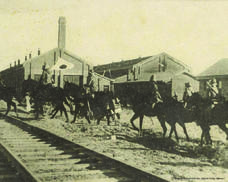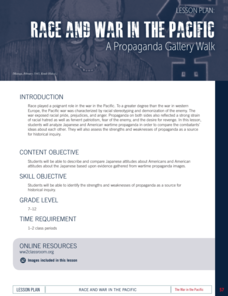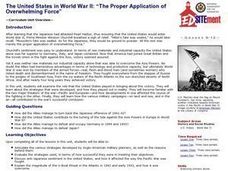National WWII Museum
Picturing the War in the Pacific Photos, Datelines and Captions
Young historians have the opportunity to see photos from the war in the Pacific and learn more about what each photo represents. Scholars use their knowledge of WWII to match dates and descriptions to real-life photos from the war. The...
National WWII Museum
Race and War in the Pacific: A Propaganda Gallery Walk
Race played a key role in the war in the Pacific during World War II. Using images from both American and Japanese sources, learners consider racial propaganda and how leaders used it to rally popular support during the conflict. After...
EngageNY
Building Background Knowledge: “War in the Pacific,” Part 2
Who did what? Readers take a closer look at War in the Pacific to determine each country's actions. As they read, scholars underline American actions in one color and actions of Japan in another. They then begin completing Pearl Harbor...
EngageNY
Launching The Performance Task: Building Background Knowledge: “War in the Pacific,” Part 1
It's all about a bit of give and take. Scholars silently read War in the Pacific and circle any unfamiliar words. Using context clues, they write each word on a strip of paper along with the inferred definition. After looking the word up...
National WWII Museum
Picturing the War in the Pacific: A Visual Time Line
The Pacific theater was critical to the Allied victory of World War II. Learners deconstruct the sequence of events around the conflict using stunning photographs. After they finish, pupils consider what additional dates and images they...
National WWII Museum
The War in the Pacific by the Numbers
It may be difficult to quantify the cost of war, but an informative resource shows learners the toll of the Pacific campaign during World War II. From the number of presidents who served during the war (two) to the square feet of a...
National WWII Museum
Strategic Decision-Making in the Pacific
Pivotal moments happened in the Pacific Theater during World War II. Some of these turning points were the result of quick decision making, while others were the result of long-term strategies. Scholars evaluate the decisions using...
Curated OER
World War II: The Pacific
Young scholars explore the events in the pacific during World War II. For this World War II lesson, students use reference material to access information about significant locations in the War. Student debate the use of the atomic bomb...
National Endowment for the Humanities
How to Win a World War
High schoolers are have begun to learn the art of diplomacy with each other, but do they understand how diplomacy works at a global level? The second in a series of four lessons, guides scholars in evaluating primary sources. The why...
National WWII Museum
Strategic Decision Making in the Pacific Scenarios
Individuals decide what they would do when faced with a difficult military decision that puts others' safety in jeopardy. The lesson also gives the real-life outcomes of the scenarios that occurred during World War II to give them a...
Curated OER
Where in the World War? Mapping WWII in the Pacific
Students explore the Pacific Theatre of War. For this World War II lesson, students use reference material to access information about significant locations in the Pacific Theatre of War. Students identify the locations of the listed...
EngageNY
Connecting Ideas in Primary and Secondary Sources: What Led to the Attack on Pearl Harbor?
Let's make some sense of those thoughts! Scholars continue thinking about the different perspectives on Pearl Harbor. They analyze quotes from War in the Pacific, Day of Infamy, and Fourteen-Part Message. Readers tape each quote to chart...
Alabama Department of Archives and History
Inside the Wire: Internment of Prisoners of War in Alabama during World War II
Create an open environment of discussion and collaboration with several exercises in a thought-provoking resource. Pupils conduct a gallery walk and lead a discussion before filling out a question sheet and chart during the learning...
Curated OER
Turning the Tide in the Pacific, 1941-1943
Students analyze the Japanese strategy for the Pacific and compare it to the Allied strategy. They identify on a map the sites that were important the early war in the Pacific, and identify key military engagements.
Curated OER
"The Proper Application of Overwhelming Force": The United States in World War II
Young scholars examine the role that the U.S. played in bringing about victory in the two major theaters of the war in the Pacific and Europe. How the various military campaigns contributed to the war's successful conclusion forms the...
Curated OER
World War II - The Allied Response
Your class will benefit from this excellent presentation on World War II, and the Allied Response to Hitler's threat. The PowerPoint is packed with important information about battles, key figures in the war, and has an excellent...
Curated OER
World War II in the Pacific and the End of the War
Students study the World War in the Pacific. In this Geography lesson, students develop an awareness of key issues and events from the conflict. Students write a well-organized essay describing this event.
Roy Rosenzweig Center for History and New Media
War and Poetry
A band of brothers or the Devil's agents? Nobel warriors freeing the oppressed or mercenaries working for the military/industrial complex? Groups examine poems from the Civil War, World War I, and World War II to determine the poets'...
Curated OER
The Civil War (1861-1865) Through Maps, Charts, Graphs, & Pictures
True to its titles, this engaging and appealing presentation brings the 1860's into close focus with a number of images and statistics that would delight any Civil War buff. A few graphs allow for pupil input, such as listing the...
Curated OER
Turning the Tide in the Pacific, 1941-1943
High schoolers explore the overall strategies pursued by the Japanese and the Allies in the initial months of World War II. What each side hoped to accomplish what what actually happened forms the basis of a comparison made in this lesson.
US National Archives
WWII: The Pacific 1939-45 – Pearl Harbor
Though December 7th, 1941 was a day "which would live in infamy," World War II had provided many infamous days, events, battles, and atrocities in the years before. So why were American forces so surprised when Japan attacked Pearl...
Curated OER
Countries Involved in World War II
Students create their own floor map of Europe, Northern Africa, and the Pacific. They locate, identify, and speak for one of the countries involved. In addition, they classify the country they represent as an Axis Power or as an Allied...
Curated OER
Victory in the Pacific, 1943-1945
Students examine the military campaigns of the Pacific theater, tracing the path of the Allied offensives. The lesson presents what the Allies were trying to accomplish and why.
Constitutional Rights Foundation
The Cold War: How Did It Start? How Did It End?
What is the difference between a Cold War and a Hot War? Scholars research the beginning of the Cold War. They analyze diary entries as well as excerpts from various events during the 45-year standoff. To finish, they prepare final...

























